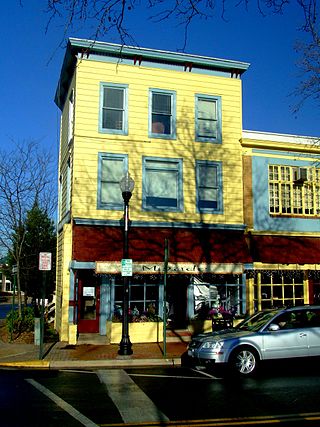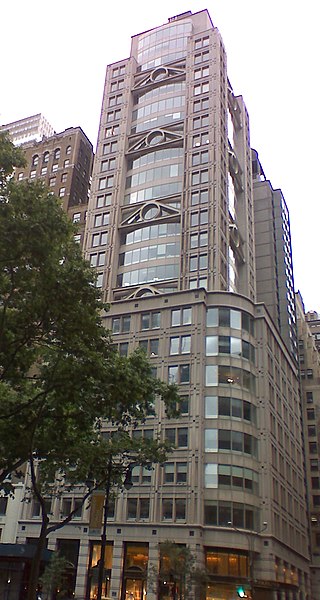Related Research Articles

This aims to be a complete list of the articles on real estate.
A property tax is an ad valorem tax on the value of a property.
Owner-occupancy or home-ownership is a form of housing tenure in which a person, called the owner-occupier, owner-occupant, or home owner, owns the home in which they live. The home can be a house, such as a single-family house, an apartment, condominium, or a housing cooperative. In addition to providing housing, owner-occupancy also functions as a real estate investment.

A housing cooperative, or housing co-op, is a legal entity, usually a cooperative or a corporation, which owns real estate, consisting of one or more residential buildings; it is one type of housing tenure. Typically housing cooperatives are owned by shareholders but in some cases they can be owned by a non-profit organization. They are a distinctive form of home ownership that have many characteristics that differ from other residential arrangements such as single family home ownership, condominiums and renting.
Real estate appraisal, property valuation or land valuation is the process of developing an opinion of value for real property. Real estate transactions often require appraisals because they occur infrequently and every property is unique, unlike corporate stocks, which are traded daily and are identical. The location also plays a key role in valuation. However, since property cannot change location, it is often the upgrades or improvements to the home that can change its value. Appraisal reports form the basis for mortgage loans, settling estates and divorces, taxation, and so on. Sometimes an appraisal report is used to establish a sale price for a property.

Real estate economics is the application of economic techniques to real estate markets. It tries to describe, explain, and predict patterns of prices, supply, and demand. The closely related field of housing economics is narrower in scope, concentrating on residential real estate markets, while the research on real estate trends focuses on the business and structural changes affecting the industry. Both draw on partial equilibrium analysis, urban economics, spatial economics, basic and extensive research, surveys, and finance.
A property manager or estate manager is a person or firm charged with operating a real estate property for a fee. The property may be individual title owned or owned under the sectional title, share block company owned, and may be registered for residential, commercial office, and retail or industrial use. In 2006, the Bureau of Labor Statistics Office of Occupational Statistics reported that there were 329,000 property managers employed in the United States, with the number expected to grow to by 50,000 by 2016.
A real-estate bubble or property bubble is a type of economic bubble that occurs periodically in local or global real estate markets, and it typically follows a land boom. A land boom is a rapid increase in the market price of real property such as housing until they reach unsustainable levels and then declines. This period, during the run-up to the crash, is also known as froth. The questions of whether real estate bubbles can be identified and prevented, and whether they have broader macroeconomic significance, are answered differently by schools of economic thought, as detailed below.
Capitalization rate is a real estate valuation measure used to compare different real estate investments. Although there are many variations, the cap rate is generally calculated as the ratio between the annual rental income produced by a real estate asset to its current market value. Most variations depend on the definition of the annual rental income and whether it is gross or net of annual costs, and whether the annual rental income is the actual amount received, or the potential rental income that could be received if the asset was optimally rented.
Green development is a real estate development concept that considers social and environmental impacts of development. It is defined by three sub-categories: environmental responsiveness, resource efficiency, and community and cultural sensitivity. Environmental responsiveness respects the intrinsic value of nature, and minimizes damage to an ecosystem. Resource efficiency refers to the use of fewer resources to conserve energy and the environment. Community and cultural sensitivity recognizes the unique cultural values that each community hosts and considers them in real estate development, unlike more discernable signs of sustainability, like solar energy,. Green development manifests itself in various forms, however it is generally based on solution multipliers: features of a project that provide additional benefits, which ultimately reduce the projects' environmental impacts.

Commercial property, also called commercial real estate, investment property or income property, is real estate intended to generate a profit, either from capital gains or rental income. Commercial property includes office buildings, medical centers, hotels, malls, retail stores, multifamily housing buildings, farm land, warehouses, and garages. In many U.S. states, residential property containing more than a certain number of units qualifies as commercial property for borrowing and tax purposes.

A condo hotel, also known as a condotel, hotel condo, or a contel, is a building that is legally a condominium but operated as a hotel, offering short-term rentals, and which maintains a front desk.

Real estate investing involves the purchase, management and sale or rental of real estate for profit. Someone who actively or passively invests in real estate is called a real estate entrepreneur or a real estate investor. Some investors actively develop, improve or renovate properties to make more money from them.
Under Section 1031 of the United States Internal Revenue Code, a taxpayer may defer recognition of capital gains and related federal income tax liability on the exchange of certain types of property, a process known as a 1031 exchange. In 1979, this treatment was expanded by the courts to include non-simultaneous sale and purchase of real estate, a process sometimes called a Starker exchange.
Leaseback, short for "sale-and-leaseback", is a financial transaction in which one sells an asset and leases it back for the long term; therefore, one continues to be able to use the asset but no longer owns it. The transaction is generally done for fixed assets, notably real estate, as well as for durable and capital goods such as airplanes and trains. The concept can also be applied by national governments to territorial assets; prior to the Falklands War, the government of the United Kingdom proposed a leaseback arrangement whereby the Falklands Islands would be transferred to Argentina, with a 99-year leaseback period, and a similar arrangement, also for 99 years, had been in place prior to the handover of Hong Kong to mainland China. Leaseback arrangements are usually employed because they confer financing, accounting or taxation benefits.
In the field of commercial real estate, especially in the United States, a net lease requires the tenant to pay, in addition to rent, some or all of the property expenses that normally would be paid by the property owner. These include expenses such as property taxes, insurance, maintenance, repair, and operations, utilities, and other items. These expenses are often categorized into the "three nets": property taxes, insurance, and maintenance. In US parlance, a lease where all three of these expenses are paid by the tenant is known as a triple net lease, NNN Lease, or triple-N for short and sometimes written NNN.

Trump Plaza also known as Trump Plaza Residences, is the first of two apartment complex buildings to be built in Jersey City, New Jersey. Trump Plaza Residences is 532 ft tall (162 m) and has 55 floors, and is the 7th tallest residential building in New Jersey. In 2020, the Trump name was removed from the properties and has been renamed the 88 Morgan Street Condominiums.

461 Fifth Avenue is a 28-story skyscraper in Midtown Manhattan, New York City, at the northeast corner of Fifth Avenue and 40th Street. The building was constructed in 1988 by the Mitsui Fudosan development group and designed by Skidmore, Owings & Merrill.
In commercial real estate, recoverable expenses are those expenses of running a property that are billed back to the tenants as a form of additional rent. A simple example is the electricity bill for a large complex that is then divided up among the tenants. Water, natural gas, cleaning and other operating expenses are often considered recoverable, as well as some periodic capital expenses. Not all expenses are recoverable, those that directly benefit only the landlord are generally not included. For instance, spending on advertising to attract new tenants does not directly benefit existing tenants, and thus is not generally included as a recoverable item.
Real estate business is the profession of buying, selling, or renting real estate.